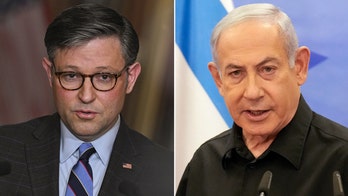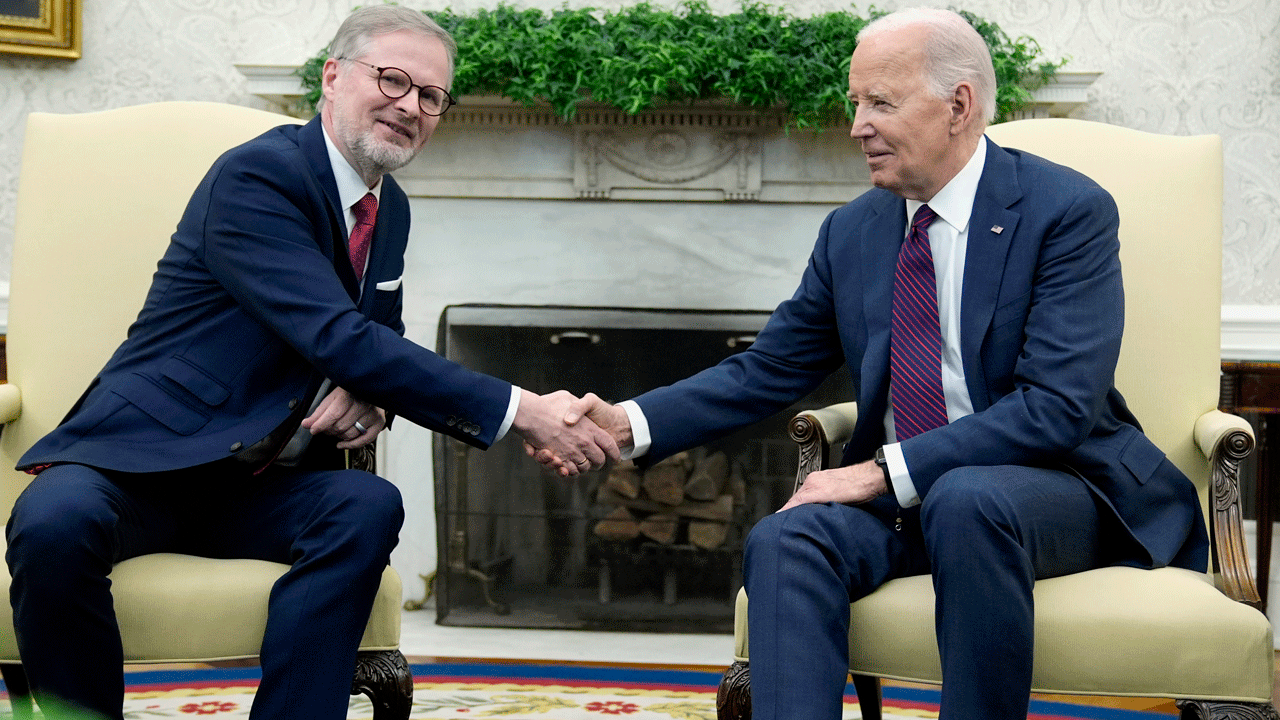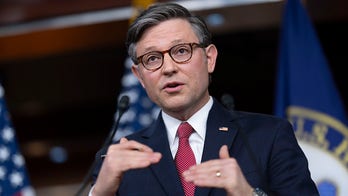"It's the reverse of intimidation. He's simply making an observation about precedent and the fact that he expects the court to adhere to that precedent. It's obviously, as he made clear [Tuesday], up to the court to make its determination. And we will wait and see what the Court does. But I guess you could argue that circuit court judges who ruled on this were trying to intimidate or influence the Court when they issued opinions... including very prominent conservative judges... court of appeals rather... when they issued opinions the 'Affordable Care Act' was constitutional. And it is entirely constitutional with keeping with 80 plus years of judicial precedent."
-- White House Press Secretary Jay Carney when asked about President Obama cautioning the justices of Supreme Court against overturning his health law.
The long-standing complaint from President Obama's supporters and many political professionals is that the president has trouble showing passion and connecting with voters.
His aura of aloofness was not so much a liability in 2008. He ran then as the man in the "Hope" poster -- gazing to the future with an up-tilted chin. But after more than three years in office, Obama needs to be more flesh-and-blood, especially given that he is running as a "middle-class warrior." A populist pitch requires a populist candidate who fights, not a symbolic figure of America's aspirations of social justice and fairness.
The Republicans have settled on a 2012 standard bearer that gives Obama a run for his money when it comes to bloodless delivery, but even Mitt Romney's clipped, boardroom diction and wrinkle-free dungarees aren't a guarantee that Obama can pull off his transition.
Given the lousy national mood and general frustration among voters, Obama wants to go from what Michael Knox Beran described as a "shamanistic healer" to the president's preferred role for 2012: a Trumanesque, give 'em Hell, populist.
Romney has often erred when trying to be "relatable," expressing his appreciation of "cheesy grits" and friendship with NASCAR owners. But the Romney that has emerged from the Republican nomination process looks very much like the one we met in 2008: blue suited, buttoned down and all business. Letting "Mitt be Mitt," means the opposite of what it would in most candidates: more restraint on the stump and in interviews, not less.
While Romney embraces his Power Point style in his quest to become the government's CEO, Obama is trying very hard to develop a new persona for his re-election bid and not doing very well at it.
Obama is excellent at the soft sell. It still works in one-on-one interviews with friendly journalists. When he talks to CBS reporters about his family and his dreams for his daughters or his sympathy for struggling Americans and military families, Obama is commanding. This is why you will see a great deal of the first lady and the first family this year. Voters may disapprove of Obama's handling of the economy, but they are very high on his performance as a father.
But that doesn't remedy the central problem for the president: that voters might be convinced that he is in way over his head. The disappointments with the president's big initiatives -- his embattled health law and disappointing 2009 stimulus package - have led many to conclude that Obama just isn't up to the job. That's certainly Romney's principal attack on the president.
To combat this, the president is casting himself as a defiant figure doing battle with the forces of evil - Republicans, oil companies, etc.. Rather than the healer and uniter of 2008, Obama is trying to embrace the role of the angry populist. He's having trouble, though.
This week, Obama turned his righteous indignation upon the "unelected" justices of the Supreme Court. He was trying to make common cause with his supporters who are outraged that justices selected by Republican presidents might undo the creation of a universal health insurance entitlement Democrats have been seeking for four generations.
But commanders in chief have to be very careful about swatting at the Supreme Court, the head of the weakest branch of government. He tried to insulate himself from criticism that he was bullying the court by using a term his Republican predecessor had used in "unelected" and stating that he was not doing anything more than "conservative commentators" had done in railing against judicial activism.
But of course, George W. Bush didn't bash "unelected" judges in the context of urging the Supreme Court how to decide on a specific case, much less one on which his political future hinged. And, as the White House has struggled to learn, the president cannot lower himself to a different standard for rhetoric. The president is always the president. He can never be Charles Krauthammer.
As a result, Team Obama has spent much of this week climbing down from its unsteady perch. The president rephrased himself and his people have tried to further walk back the attack. Press Secretary Jay Carney, though, gave a strong indication that the president and his men don't have a grasp of how to strike a populist tone. Carney compared Obama's lines to the opinions rendered by lower courts on the health law. Again, the president is always the president.
On the campaign stump, Obama has struggled even more with his tone. What he and his speechwriters must believe is a "fired-up and ready-to go" reflection of everyman outrage is missing the mark. When Obama mocks and jeers at Romney or House Budget Committee Chairman Paul Ryan, it sounds small and petty. Presidents must avoid mean-spirited attacks.
Obama has been trying out his new, ironic, taunting style in recent swing state stump speeches and this week in remarks to newspaper reporters and editors in Washington. Americans want their president, especially one who offered healing and an elevation of the public discourse, to be the bigger man. Obama's 2012 version of himself is not living up to those expectations.
The Day in Quotes
"Nancy Pelosi famously said that we would have to pass Obamacare to find out what was in it. President Obama has turned that advice into a campaign strategy: He wants us to re-elect him so we can find out what he will actually do. With all the challenges the nation faces, this is not the time for President Obama's hide-and-seek campaign."
-- Likely Republican presidential nominee Mitt Romney in a speech to the Newspaper Association of America.
"[Mitt Romney is] very much lashed to Ryan and the House Republicans. They share an economic view and a view on the budget. By essentially embracing the framework of Ryan, Romney is also embracing the steps that would be necessary to implement it."
-- David Axelrod, chief political strategist to President Obama, talking to the New York Times.
"We believe that it is in the interest of the United States to engage with all parties that are committed to democratic principles, especially nonviolence."
-- National Security Council spokesman Tommy Vietor to Reuters on news that members of Egypt's Muslim Brotherhood, that nation's largest Islamist group, visited the White House this week for talks with administration officials.
"They're learning from each of these incidents and becoming more dangerous."
-- Rep. Mike Rogers, R-Mich., talking to the New York Times about new evidence that Iran's intelligence forces are instigating unrest and terrorist attacks against allied forces in Afghanistan.
"The Navy SEALs shot Usama Bin Laden in Pakistan and [Environmental Protection Agency Director] Lisa Jackson shot us in Washington."
-- Cecil Roberts, the head of the United Mine Workers of America, in an interview with Hoppy Kercheval of West Virginia MetroNews about new coal regulations from the Obama administration.
"We have an opportunity to reset this race again after Pennsylvania. The calendar in May looks very, very interesting -- a lot of strong conservatives states who are looking for an opportunity to tighten this race back up."
-- Former Pennsylvania Sen. Rick Santorum talking to supporters in Altoona, Pa. on Wednesday, his last day of campaigning before taking a four-day Easter break.
"We're looking at alternative options to the U.S., of course."
-- Tom LaSorda, CEO of electric car manufacturer Fisker, as quoted by the Detroit News talking to reporters after announcing that the car company may drop plans to open an assembly plant in Delaware, despite nearly $200 million in subsidized federal and state loans and the strong backing of Vice President Joe Biden, a former Delaware senator.
"If the casino moguls want a train, let them build it with their own money; taxpayers shouldn't have to go along for the ride."
-- Washington Post editorial urging the Obma administration to reject a pending $4.9 billion loan backed by Senate Majority Leader Harry Reid to construct a high-speed railroad from Southern California to Las Vegas.
"$822,000"
-- Amount spent on a 2010 junket to Las Vegas for employees of the General Services Administration, which on Wednesday became the subject of House hearings.
And Now, A Word From Charles
"When the president said 'I have your back,' he said it to the group of pro-Israel lobby in the United States. The next day he said, 'Well, by that, I meant the same way we have the back of the British and the Japanese,' which was a way to completely undo any effect. It was interpreted as meaning if you don't strike, we will strike. But then he made it obvious that it was only an interpretation he wanted the AIPAC people to accept. That is not his intention at all."
-- Charles Krauthammer on "Special Report With Bret Baier."
Chris Stirewalt is digital politics editor for Fox News, and his POWER PLAY column appears Monday-Friday on FoxNews.com.




